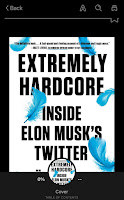Picked up this book to satisfy a curiosity — 'Extremely Hardcore: Inside Elon Musk's Twitter' (2024) by Zoë Schiffer. The reporter-author drew on interviews with staff, ex-staff, internal documents, court filings and congressional testimony to do a literal summary of what happened when Twitter changed hands, and its name.
Musk the Meglomaniac ran the company the way he wanted to. The layoffs in end 2022 and 2023 were an absolute massacre. Paranoia about press leaks meant that new employee contracts were strict. Everything was absolutely bananas. (Reviews here, here and here.)
Intentionally or not, Musk had taken the Trump playbook and applied it to the trust and safety field. He claimed it was about ethics, free speech, transparency. In reality, it was about silencing his perceived enemies. Musk didn't blame Jack Dorsey for Twitter's supposed missteps, though he'd been CEO at the time. He blamed Roth and Vijaya Gadde. It didn't seem like an accident.
I don't care about Elon Musk or his achievements or whatever. I wanted to have a sense of how human resources policies are carried within such a company and what happened to the staff of Twitter. Many names came out to accuse Musk of unfair firing. Ex-Twitter engineer Randall Lin is a name that is loud too. He contributed loads of information to the author in writing this book. Yao Yue is an infrastructure engineer fired and she sued for unfair firing. All these are classic cases of 'how not to treat your staff' but if your new boss is rich and powerful enough, nobody gives a shit about it.
X's collapse into disinformation and chaos was the culmination of many of Musk's decisions over the past year, including cutting off free API access for researchers, laying off trust and safety experts, and allowing anyone with $8 to buy a bus check mark.
Less than a week after the violence started, EU regulators opened an inquiry into X over the alleged spread of illegal content and disinformation, "in particular the spreading of terrorist and violent content and hate speech," which may have violated the Digital Services Act.
The need for a new platform to follow news in real time had never been more apparent. In the days that followed, Threads was more lively than it had been since the week after its debut. Yet Meta continued to resist calls to lean into news, wary of repeating past mistakes in amplifying misinformation. "We're not anti-news," Mosseri wrote. "News is clearly already on Threads. People can share news; people can follow accounts that share news. We're not going to get in the way of any either. But, we're also not going to go to amplify news on the platform. To do so would be too risky given the maturity of the platform, the downsides over-promising, and the stakes."
Hate speech was abound on the revamped X, and advertising revenue dropped. Former Twitter employees began class action suits, and there're more than two thousand individual arbitration claims filed by employees still waiting on severance, including former executives. I really wouldn't want to be in that position. Ugh.
I'm completely off Twitter. Didn't bother about archiving tweets either. The moment Elon Musk bought over Twitter for $44 billion and completed his acquisition towards the end of 2022, and changed it over to X, I logged out and deleted the app.

No comments:
Post a Comment